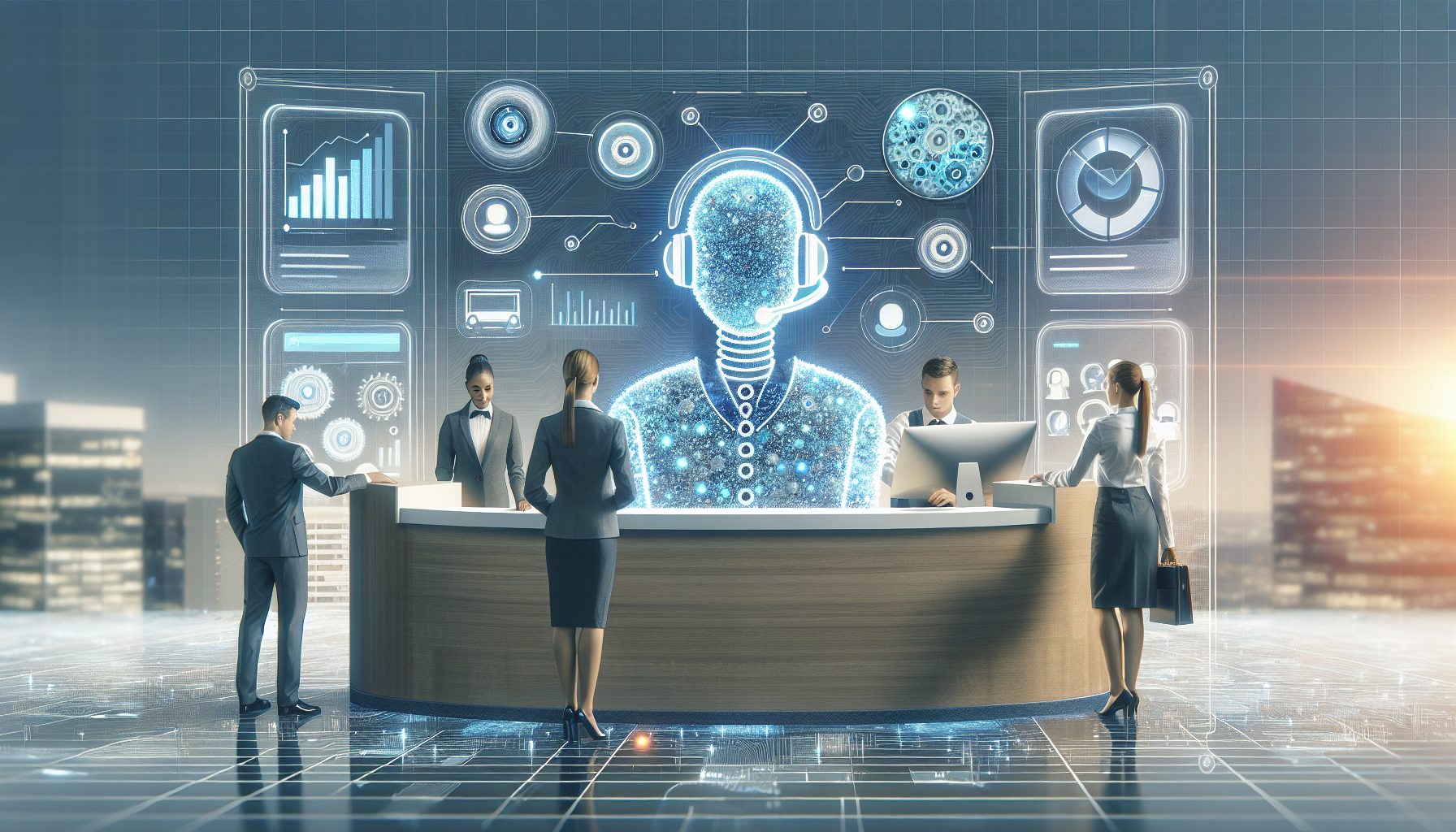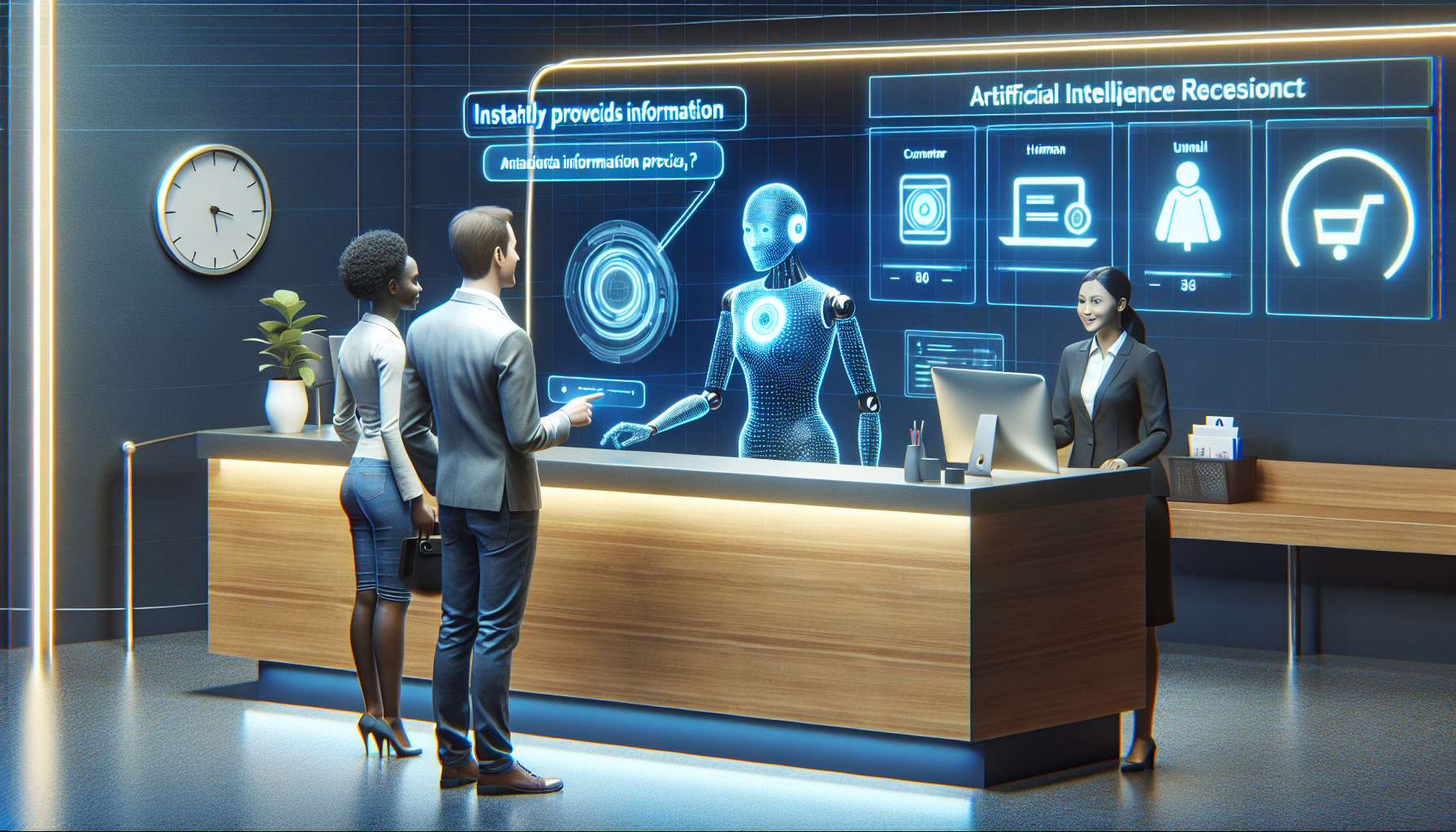
With businesses constantly aiming to improve efficiency and customer service, the prospect of artificial intelligence (AI) making significant strides in these areas is gaining traction. One glaring example is the advent of AI Receptionists. For organizations in the service industries, where attendance to customer needs is paramount, AI Receptionists can significantly enhance workflow management by swiftly and systematically handling a sizable variety of tasks.

AI Receptionists are virtual assistants powered by complex technology such as machine learning algorithms and voice recognition. They are programmed to understand natural human language and carry out tasks like answering phone calls, scheduling appointments, providing information, and transferring calls, all without any human intervention.
The technology behind these AI Receptionists is twofold. First, voice recognition technology allows the system to understand and interpret human speech, transforming it into a format that the system can understand. This technology enables AI Receptionists to communicate with clients in a conversational manner, mimicking the interaction they would have with human receptionists.
Second, machine learning algorithms enable AI Receptionists to learn from previous interactions, allowing the system to continuously improve its performance over time. These self-learning capabilities mean that the AI Receptionist becomes more efficient and effective with every customer interaction, further enhancing workflow management.
With these advanced technologies, AI Receptionists can play a pivotal role in improving efficiency, reducing workloads, and enabling real-time service delivery, all without the need for human intervention. In the era of digital transformation, the possibilities of this technology for service industries seem boundless.
The integration of AI receptionists into the service industry has paved the way for a revolutionized client experience. One of the pivotal aspects of their contribution is in the realm of workflow management. Harnessing the power of Artificial Intelligence, these virtual assistants can handle multiple tasks simultaneously, thereby enhancing customer interaction and efficiency of operations.
Natural Language Processing (NLP) is an integral feature embedded within AI receptionists. Pioneered by machine learning algorithms, NLP interprets human language in a way that is both meaningful and tactful. It facilitates effective communication between the receptionist and the customer, making the exchange seamless and natural.
AI receptionists are programmed to be efficient multitaskers. In contrast to their human counterparts, they can effortlessly manage a multitude of calls at the same time. This means reduced wait times for customers, leading to increased satisfaction. By dealing with multiple interactions concurrently, AI receptionists improve workflow management and allow for smoother operations within the service industry.
Moving forward, the most significant advantage of AI receptionists is their ability to operate 24/7 without any breaks. This non-stop service ensures every customer query is handled promptly, regardless of the time it is made. Such round-the-clock service is especially advantageous for businesses that cater to clients spread across different geographical locations and time zones. Studies have shown that swift and timely response builds a positive customer experience, thus aiding in customer retention and loyalty.
In conclusion, the role of an AI receptionist is not limited to answering calls and redirecting them. Their focal role lies in managing workflow effectively and their ability to enhance and improve customer service is paramount. The service industry should embrace this innovative technology to optimize their workflow, increase productivity and redefine their customer interaction strategy for better growth and success.
An urgent need for improved operational efficiency is calling for innovative solutions in service industries. Among these innovative solutions, a notable mention is the rapidly evolving technology of AI Receptionists. Primarily used to automate reception tasks, these AI interfaces have also proven to be highly effective in improving overall workflow management.

AI receptionists are capable of digitally integrating with virtually any business application, resulting in streamlined operations. A prime example of this integration capability is demonstrated when AI receptionists are synced with Zapier, a well-known automation platform.
When an AI receptionist, such as Reception.AI, is integrated with Zapier, it can connect with more than 3,000 applications. This fusion allows a harmonious flow of information across disparate systems, consequently enhancing the operational efficiency.
For instance, when a call comes through the AI, the receptionist can respond to enquiries and simultaneously record the details of the conversation in a customer relationship management (CRM) system like Salesforce. Thus, every conversation is properly documented, fostering seamless communication and efficiency.
In conclusion, by improving data accessibility and information flow through digital integration, AI receptionists set the stage for a more efficient and effective service industry. The integration capability of AI receptionists with robust platforms like Zapier is proving to be a game-changer in enhancing overall operational efficiency.
In the service sector, many businesses have found success in leveraging AI Receptionists to streamline their operations. Here, we present a couple of compelling case studies showcasing the affects AI Receptionists have had on workflow management in different industries.
In the hotel industry, the Mews system provides a solid case study. This all-in-one hotel management platform implemented an AI Receptionist that assumes mundane administrative tasks, freeing up the human staff to focus on delivering world-class guest experiences. The results? Enhanced customer service and a notable increase in overall efficiency.
Moving on to the healthcare domain, ZDNet shares an enlightening case study of a primary care clinic that deployed an AI Receptionist to assist in appointment scheduling, health record management and maintaining patient confidentiality. The stringent demands and responsibilities of the medical industry call for precision, and the AI's infallible nature has helped minimise human errors. Moreover, the clinic saw a surge in employee productivity and observed a more efficient workflow, with the AI handling voluminous paperwork, enabling human staff to dedicate more time to patient care.
Finally, let's look at law firms. The legal sector, renowned for its heavy flow of paperwork and time-consuming administrative tasks, typically provides fertile ground for technological innovation. The introduction of an AI Receptionist in a renowned law firm revolutionised their document management, client communication and appointment scheduling processes. This justly led to the firm being more organised and composed, with significantly enhanced workflow management.
In conclusion, the implementation of AI Receptionists has shown to drastically improve workflow management across multiple service industries. Embracing this technology can aid businesses in becoming more efficient, reducing errors, improving service delivery, and ultimately, boosting their bottom line.
The rapid advancements in Artificial Intelligence (AI) have not only disrupted the traditional domains of service industries but continue to shape the future of workflow management. AI receptionists, equipped with an uncanny ability to implement automation, streamline processes, and bolster productivity, are redefining the dynamics of the sector.
Future trends revolve around personalization, productivity, and predictive intelligence, all culminating under the comprehensive umbrella of AI receptionists. Projections indicate an increase in AI-powered virtual assistants due to their robust potential to improve client engagement. AI's capability to analyze data and build customer profiles makes it astoundingly efficient in anticipating individual needs and delivering personalized services. The Forrester’s AI adoption forecast predicts that by 2025, personalization engines powered by AI will influence 80% of online purchases.

AI receptionists are being primed not only to help with customer interaction but also to optimize internal tasks. They can free human resources from repetitive tasks, enabling them to focus on more strategic assignments. By automating administrative tasks and enabling real-time data analysis, businesses can drastically enhance their productivity.
In the era of pervasive connectivity and the Internet of Things (IoT), the role of AI receptionists continues to evolve. The promise and challenge of the age of Artificial Intelligence, as described by McKinsey, hinges on the integration of AI and IoT. The synchronicity between these two technologies could mould the workflow management of the future, thereby enabling AI receptionists to anticipate and react to an extensive range of workplace occurrences.
In essence, the swift progression in AI reception technologies is driving unprecedented changes and encapsulating new possibilities in service industries. As we advance, the role of AI receptionists will no longer be confined to simple tasks but will be a stepping stone towards an increasingly digitized and efficient business world.
As we dive deeper into the digital age, service industries are incessantly seeking ways to improve efficiency and productivity. Among the game-changing solutions gaining traction is the use of AI Receptionists. These advanced tools, powered by Artificial Intelligence, have been instrumental in streamlining workflow management. However, it's not all plain sailing. There are challenges and considerations to keep in mind when integrating such cutting edge technology.
One significant challenge is privacy concerns. Despite the transformative potential of AI receptionists, they operate by collecting and processing copious amounts of data. As part of their task, they may handle sensitive information about customers or partners. This raises serious questions about how to ensure data privacy and security. A robust data protection framework needs to be in place to mitigate any potential breaches, causing trust issues and reputational damage.
The second considerable challenge is maintaining the human touch in customer service. Automating reception tasks with AI can indeed provide consistency and speed, but it may not replicate the empathic connection intrinsic to human interaction. This leaves a high possibility of customers feeling depersonalized within the service experience, potentially impacting customer loyalty and retention.
Therefore, while AI Receptionists pose great potential to improve workflow management in service industries, these concerns cannot be overlooked. A balanced approach could be integrating AI technology, not as a total replacement but in conjunction with human staff. Ultimately, this hybrid model might offer businesses, the best of both worlds - the efficiency of AI and the comfort and warmth of human interaction.
Implementing AI receptionists is, therefore, a complex yet fruitful task that requires meticulous planning and execution. Championing this blend of AI and human touch will undoubtedly pave the way to enhancing customer service experience, productivity, and overall workflow in the service industry.
Start your free trial for My AI Front Desk today, it takes minutes to setup!








